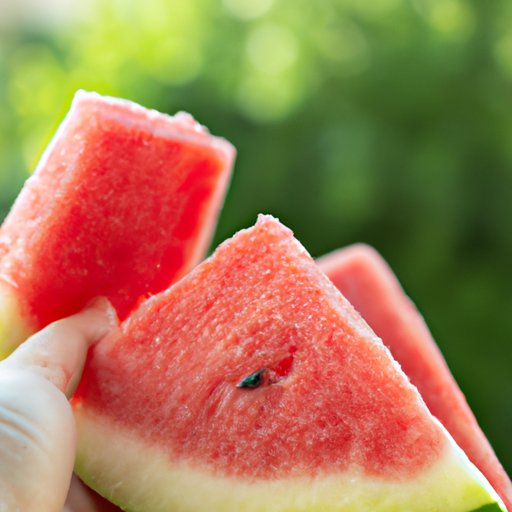
Introduction
Vitamin C is one of the most vital nutrients that our bodies need to function properly. It helps our body in various ways, including boosting our immune system, promoting collagen production, and combating free radicals that can damage our cells. Many fruits and vegetables are rich in vitamin C, but there’s one fruit that has been the subject of controversy – watermelon. In this article, we’ll explore the truth about watermelon and its vitamin C content.
The Surprising Truth: Does Watermelon Have Vitamin C?
Many people believe that watermelon contains no vitamin C. However, the truth is quite different. While it may not be as rich in vitamin C as citrus fruits or kiwis, watermelon does contain this essential nutrient.
The Nutritional Benefits of Watermelon: Unpacking the Myth About Vitamin C
Watermelon is a very nutritious fruit and contains many other essential nutrients besides vitamin C. For example, it contains vitamin A, which promotes healthy skin and vision, as well as potassium, which helps regulate blood pressure. It is also a good source of lycopene, an antioxidant that may help reduce the risk of certain cancers.
Therefore, while vitamin C is undoubtedly important for our health, it’s not the only nutrient that we should consider when choosing what fruits and veggies to consume.
The Science Behind Watermelon and its Vitamin C Content
Vitamin C is a water-soluble vitamin that is found in many fruits and vegetables, including watermelon. It plays a crucial role in maintaining our bodily functions and protecting us from various diseases. Interestingly, vitamin C also helps our body absorb iron from plant-based foods.
So, how much vitamin C does watermelon contain? According to the USDA, one cup of diced watermelon (152 grams) contains approximately 12.3 mg of vitamin C, which is about 14% of the recommended daily value for adults.
However, it’s important to note that various factors can affect the actual vitamin C content of a fruit. For example, exposure to heat, light, and air can all cause the nutrient to break down, reducing its levels. Additionally, different strains of watermelon may contain varying levels of vitamin C.
Debunking the Common Misconceptions: Does Watermelon Have High Levels of Vitamin C?
Many people consider watermelon a “superfood” when it comes to vitamin C. However, this claim is not entirely accurate. While watermelon does contain vitamin C, it’s not the most potent source.
When we talk about “high levels” of vitamin C, we’re typically referring to the daily recommended intake of this nutrient. The recommended daily intake of vitamin C for adults is between 75 and 90 mg per day, depending on their age and gender. As we noted earlier, one cup of diced watermelon contains roughly 12.3 mg of vitamin C, so you would need to eat several cups of watermelon to meet your daily requirement.
Watermelon: A Refreshing Fruit Packed with Vitamin C
While watermelon may not be the richest source of vitamin C, it’s still an excellent source of hydration and necessary nutrients that our bodies need. Plus, it’s a refreshing snack during the hot summer months.
Additionally, watermelon is an excellent source of citrulline, an amino acid that our body converts into arginine, which can help improve blood flow and reduce inflammation. It’s also low in calories, making it a perfect snack for those watching their calorie intake.
The Truth About Watermelon’s Vitamin Content and Why it Matters
So, what have we learned about watermelon and vitamin C? Yes, watermelon does contain this essential nutrient, but it’s not the only one we should focus on when considering our dietary needs. Watermelon is a nutritious fruit that contains many other important nutrients, including lycopene, vitamin A, and potassium.
But why is vitamin C so important, and why should we care about our intake? As we mentioned earlier, vitamin C is critical for our overall health. It helps our immune system fight off infections and disease, plays a crucial role in collagen production, and helps protect our cells from oxidative damage.
If you don’t get enough vitamin C in your diet, you may be at risk of developing various health conditions, such as scurvy, a disease that can cause fatigue, joint pain, and bleeding gums. However, vitamin C deficiency is relatively rare in developed countries since many foods are fortified with this essential nutrient.
Examining the Nutritional Properties of Watermelon: Does it Contain Enough Vitamin C?
Now that we know more about watermelon’s vitamin C content let’s summarize what we’ve learned. While watermelon does contain vitamin C, it’s not the highest source of this nutrient. However, watermelon is a nutritious fruit that can contribute to our overall health in various ways.
If you’re someone who’s concerned about getting enough vitamin C, you should ensure that you’re eating a varied diet containing various fruits and vegetables. Other rich sources of vitamin C include citrus fruits, kiwis, strawberries, and bell peppers.
Conclusion
Vitamin C is a vital nutrient that our bodies need to function correctly. While watermelon may not be the richest source of this nutrient, it’s still a nutritious fruit that can contribute to our overall health. As with any fruit or vegetable, it’s essential to consider the whole range of nutrients that it contains and not just focus on one. So, let’s continue to make informed dietary choices and nourish our bodies with the nutrients it needs.





